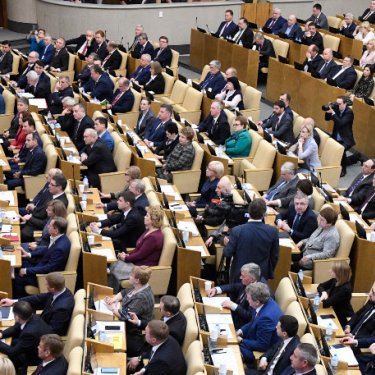Draconian new legislation forces three journalists to register as “foreign agents”

Reporters Without Borders (RSF) calls for the complete withdrawal of the judicial measures under which three journalists have been forced to register as “foreign agents” as a result of a new amendment to Russia’s “foreign agents” law, and reminds Moscow of its obligations as regards respect for press freedom.
Читать на русском / Read in Russian
Several media outlets were already on the justice ministry registry stigmatizing “foreign agents” but this is the first time journalists have had to register. They were forced to do so by the amendment signed into law on 30 December following its approval by the Duma, the Russian parliament’s lower house.
Lyudmila Stavitskaya and Sergei Markelov of Radio Svoboda (the Russian service of the US-funded Radio Free Europe/Radio Liberty) and Pskovskaya Guberniya editor Denis Kamalyagin would have risked a fine of 30,000 to 50,000 roubles (330 to 550 euros) and up to two years in prison if they had not registered as “foreign agents” with the ministry.
It is not yet clear how the new amendment will be applied. It says that individuals and organizations that are involved in “political activities” and receive “assistance from abroad” – either financial or non-financial assistance –, including from Russian citizens and NGOs labelled as “foreign agents”, will be regarded as “foreign agents.”
“Political activities” are not clearly defined. They could include just taking a public political position, according to Mass Media Defence Center (MMDC), a Russian NGO specialized in defending human rights. Journalists who are registered as “foreign agents” must mention this in all their articles. For the label to be withdrawn, they must file a request with the justice ministry, which has 60 days to respond. If the ministry refuses, their only recourse is to challenge the decision in court.
“This is another axe poised over the necks of journalists in Russia,” said Jeanne Cavelier, the head of RSF’s Eastern Europe and Central Asia desk. “The authorities keep on extending the ‘foreign agents’ law in an absurd way without clear definitions. They are using this law, which encourages self-censorship, to gradually silence all critics and even objective voices in Russia. We call for the immediate withdrawal of this amendment, adopted in haste at the end of the year, and we urge the Council of Europe to remind Russia’s leaders to respect article 10 in the European Convention on Human Rights, protecting the freedom of expression and information.”
RSF already expressed its concern at the end of 2019 about the adoption of an earlier amendment making it possible to designate independent journalists and bloggers as “foreign agents.”
A separate amendment signed into law on 30 December criminalize those who publicly “insult and defame.” Under this amendment, which could be applied to journalists in the years to come, anyone found guilty of “disseminating defamatory information”, including on social media, could be sentenced to up to five years in prison, although these terms are not precisely defined.
Finally, under the law “Against YouTube and Facebook” that President Vladimir Putin also signed into law the same day, the federal communications agency Roskomnadzor can block foreign social media platforms that seem to act in “discriminatory” manner toward Russian media. This term has not been given a precise legal definition either, which opens the way for the authorities to use it to obstruct the freedom to inform.
Russia is ranked 149th out of 180 countries in RSF's 2020 World Press Freedom Index.



